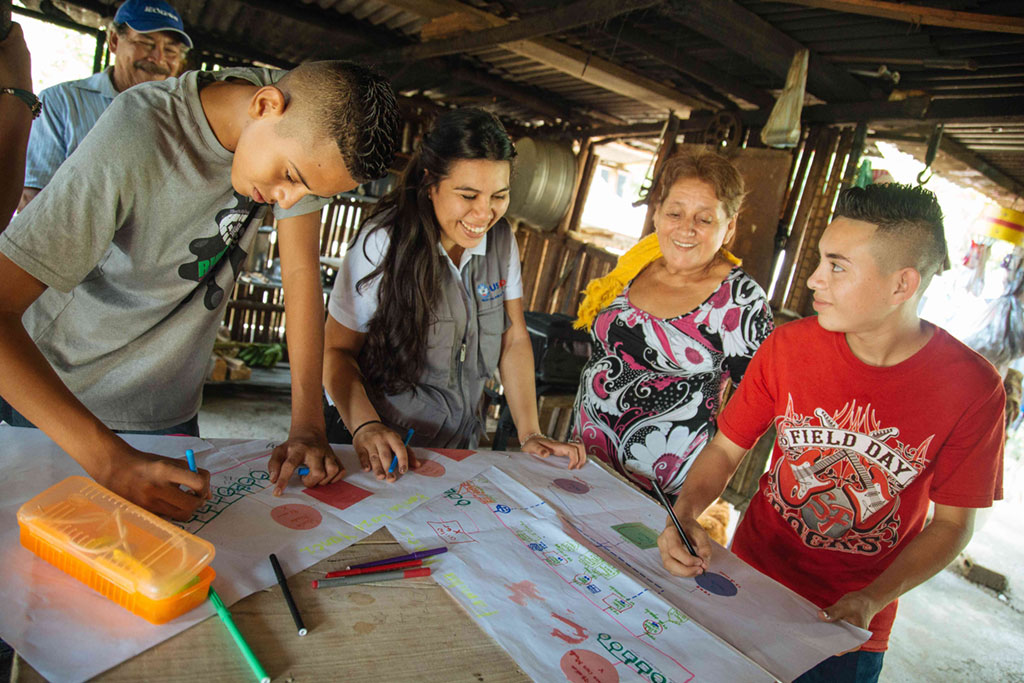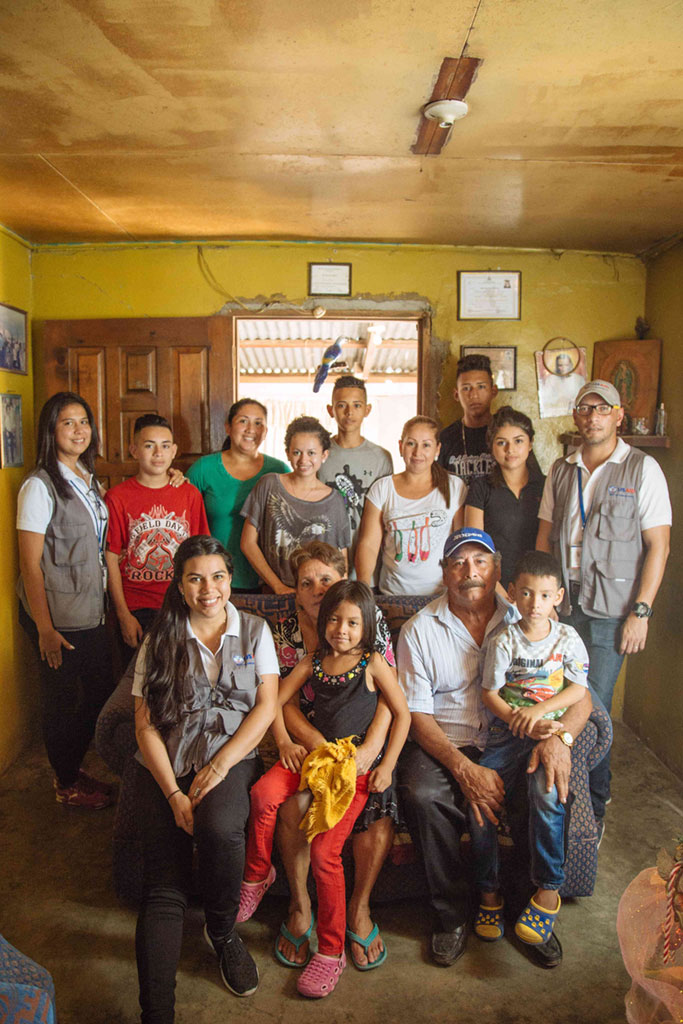CHOTEPE, Honduras – Gathered around a table with his grandparents and cousins, 15-year-old Steven is drawing a family tree with colored markers. Family members chime in, helping him add new branches of relatives as they recount family stories.
“We do the family tree, so the branches are aunts and uncles or parents. We are the roots, and the trunk is the whole family,” says Steven, who lives with extended family outside of San Pedro Sula.
“Being together, talking, is what I like most about the family, because they tell us good stories,” he adds.
The family tree, or genogram, is one tool that can help young people learn about their own roots – those that tie them to their families and communities and can be the start of a support system that lowers their risk of becoming involved in gangs and violence.
The tool is part of a family-based violence prevention program called Proponte Más, operating in five of Honduras’ most violent cities. Funded by the U.S. Agency for International Development and implemented by Creative Associates International, the program has trained 50 counselors to work directly with families of youth who are most likely to join gangs.
“We're really betting on the family's capability to transform itself and be the root or catalyst for changing the lives of many young people that have been dealing with a really difficult context here in Honduras.” Miguel Leon, Proponte Más Regional Director, San Pedro Sula
The program relies on an empirical assessment to identify youth who are at the highest risk of joining gangs, through a method known as the Youth Service Eligibility Tool. The tool evaluates youth on a series of nine risk factors at a family, peer and individual level.
Steven and his 16-year-old cousin Yuvini were determined to be at high risk, and have been participating in the program for several months.
Proponte Más’ family-based approach to working with these highest-risk youth – in a category known as “secondary violence prevention” – views a strong family support system as essential in preventing youth from getting drawn into the gangs that have turned communities into conflict zones.
Counselors spend a year working closely with youth and their families to change behaviors and relationships in a way that helps lower the youths’ risk factors for violence.

Miguel Leon, Proponte Más Regional Director in San Pedro Sula, says the family tree is a way to connect youth, and their relatives, to multiple generations. The counselors use the genogram as a jumping-off point, a way to assess the family situation while also getting youth interested in the story of their family.
“We’re trying to get the youth to, via his or her understanding of his or her family history, be able to separate himself or herself from whatever negative elements are attracting him within his or her community,” Leon says.
“We’re really betting on the family’s capability to transform itself and be the root or catalyst for changing the lives of many young people that have been dealing with a really difficult context here in Honduras,” he says.
The approach is working. After just six months of family intervention, each of the 445 youth who, like Steven and Yuvini, exhibited risk factors at a secondary level and have been participating in family-based counseling, displayed a reduction in all nine risk factor categories.
Remarkably, nearly three out of four youth lowered their risk factors to less than four altogether, which places them below the threshold for “at risk.”
Counseling in conflict zones
Proponte Más is operating in five municipalities with high rates of crime and violence: Tegucigalpa; San Pedro Sula; Choloma; Tela; and La Ceiba.
Steven and Yuvini live with their grandparents in the community of Chotepe outside of San Pedro Sula. Chotepe is part of Chamelecón, a suburb of San Pedro Sula plagued by violence caused by rival gangs. The sugarcane fields in Chamelecón are notorious as a dumping ground for bodies.
Fanny Romero, a counselor who works with Steven and Yuvini’s family, recalls feeling afraid the first time she visited. Their home sits off a road that serves as a dividing line between two rival gangs.
“It’s a part of the history surrounding Chamelecón,” she says. “Unfortunately, it’s a negative part, but we have to rescue the positive. And the positive part is the families we work with, their strength. It is, more than anything, trying to rescue these young people from this situation.”
Honduras has one of the highest murder rates in the world, recently estimated to be about 60 homicides per 100,000 residents. San Pedro Sula has consistently been ranked as one of the world’s most dangerous cities.

But when Romero visits weekly, it is in a festive atmosphere surrounded by a crowd of relatives.
“The program has helped us be more united, to get to know each other more, to be better people. And thanks to the counselor, Fanny, because she is already part of our family as well and we love her very much,” says Steven’s mother, Vanessa.
Romero also works with another set of cousins in Chotepe, Danilo and Esteban, who were referred to Proponte Más by their school. The boys, along with several other extended family members, live with their grandparents, who were worried about them getting sucked into gang life. Romero says helping youth to identify first as members of their family, differentiating themselves from area gangs, is key.
“When families are more united, young people are less likely to identify with other organized groups outside their home,” she says.
Counselors work with families to come up with new solutions to behavioral problems, such as defined tasks, increased supervision and accountability.
On a Tuesday visit from Romero, Danilo and Esteban joked and laughed and showed off their completed chore worksheets and happy face stickers, evidence that they asked permission before leaving the house. Their own colorful family tree poster was on display.
“I do my assignments now. I listen to my teachers,” Esteban says. “Before, not so much. I was kind of disobedient.”
Bringing scattered families together
Across Honduras, violence and instability have separated many families.
The gang violence and its consequences drive many residents to flee for the United States, or send their children alone on the dangerous journey. Many Hondurans also migrate in search of better economic opportunities outside the country.
Esteban’s grandmother Margarita says his mother wanted him to travel with a smuggler to join her in the U.S.
“I told her, ‘You can’t just take him like that,’” she says. “I don’t want my boys making such an ugly trip. ‘He’s just a boy and I have raised him. It’s cost me. I know I’ve had a hard time with him,’ I told her, ‘but I am not going to give him to some stranger to take him up there.'”
Robyn Braverman, Proponte Más Chief of Party, says violence, like migration, is a catalyst for disrupting family life and breaking down lines of communication.

“Oftentimes violence destroys families; it forces some families to flee and some families to stay. And it divides families as well,” she says.
“Violence can manifest itself in different ways in the families through just the lack of communication, through a rupture in relationships in general, through a lack of opportunities, which manifests itself in lots of frustration.”
One goal of Proponte Más counselors is to reconnect youth with their family members, even those that live elsewhere, and make everyone feel more comfortable communicating openly.
For Steven, Yuvini and their family, the program has helped renew lines of communication, a key step in building stronger family ties that help reduce risk factors for violence.
“They have already changed a lot. They have changed in the sense that they already have more freedom to talk with us. They tell us about their problems, they have changed a lot in their behavior,” says Vanessa, Steven’s mother.
And counselors focus not just on altering the adolescents’ communication, but also that of the parents and other relatives.
“My behavior I think it has changed a lot because of this because I have always been like that, a little further away from them. Then with this, it has already given me more confidence to be with them, to talk to them,” Vanessa says.
Proponte Más counselors work to educate the entire family about the program and its goals, even relatives who do not live in the same household. In Steven and Yuvini’s case, Romero says they are working on setting up Skype calls with Steven’s father, who lives in the U.S., and keeping relatives updated on the boys’ progress by sending photos.
“They involve everyone equally, the great aunts and uncles primarily,” Romero says. “And they are one of the strongest families. They have roots that are growing stronger, so that some burst of air doesn’t make them collapse as a family.”
With reporting by Gustavo Ochoa and Jillian Slutzker from Honduras.
